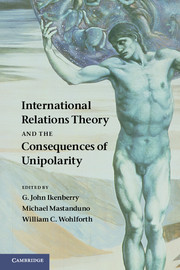Crossref Citations
This Book has been
cited by the following publications. This list is generated based on data provided by Crossref.
Hassanpour, Navid
2012.
Information and Intervention: On the Consequences of International Omniscience.
SSRN Electronic Journal,
Mearsheimer, John J.
and
Walt, Stephen M.
2013.
Leaving theory behind: Why simplistic hypothesis testing is bad for International Relations.
European Journal of International Relations,
Vol. 19,
Issue. 3,
p.
427.
Pouponneau, Florent
2013.
Les dynamiques propres de l'Union européenne dans le système international.
Politique européenne,
Vol. n° 41,
Issue. 3,
p.
118.
Chun, Chaesung
and
Kim, Sungbae
2014.
(Analysis on Diplomatic and Security Benefits of Unification and Strategies for Unification).
SSRN Electronic Journal,
Wohlforth, William C.
2014.
Power, Order, and Change in World Politics.
p.
109.
Ceccorulli, Michela
and
Lucarelli, Sonia
2014.
Security Governance: Making the Concept Fit for the Analysis of a Multipolar, Global and Regionalized World.
SSRN Electronic Journal,
Reiter, Dan
2015.
Should We Leave Behind the Subfield of International Relations?.
Annual Review of Political Science,
Vol. 18,
Issue. 1,
p.
481.
Lobell, Steven E
Jesse, Neal G
and
Williams, Kristen P
2015.
Why do secondary states choose to support, follow or challenge?.
International Politics,
Vol. 52,
Issue. 2,
p.
146.
Baubek, Somzhurek
Anna, Yessengaliyeva
and
Adil, Elmira
2015.
Shanghai Cooperation Organization and its Activities in Ensuring Human and Social Security.
The Anthropologist,
Vol. 22,
Issue. 3,
p.
510.
Tziampiris, Aristotle
2015.
The Emergence of Israeli-Greek Cooperation.
p.
21.
Bower, Adam
2015.
Norms Without the Great Powers: International Law, Nested Social Structures, and the Ban on Antipersonnel Mines.
International Studies Review,
p.
n/a.
Miller, Benjamin
and
Saltzman, Ilai Z
2016.
Beyond the three ‘isms’: Rethinking IR and the post-cold war order.
International Politics,
Vol. 53,
Issue. 3,
p.
385.
Lechner, Silviya
2017.
Why anarchy still matters for International Relations: On theories and things.
Journal of International Political Theory,
Vol. 13,
Issue. 3,
p.
341.
Zala, Benjamin
2017.
Great power management and ambiguous order in nineteenth-century international society.
Review of International Studies,
Vol. 43,
Issue. 2,
p.
367.
Cha, Victor
2017.
Informal hierarchy in Asia: the origins of the U.S.–Japan alliance.
International Relations of the Asia-Pacific,
Vol. 17,
Issue. 1,
p.
1.
Lobell, Steven E
2018.
A Granular Theory of Balancing.
International Studies Quarterly,
Vol. 62,
Issue. 3,
p.
593.
Clementi, Marco
and
Pisciotta, Barbara
2018.
US Foreign Policy in a Challenging World.
p.
1.
Clementi, Marco
2018.
US Foreign Policy in a Challenging World.
p.
99.
Carati, Andrea
2018.
US Foreign Policy in a Challenging World.
p.
165.
Roussel, Stéphane
Paquin, Jonathan
and
Massie, Justin
2018.
Le Canada face aux transitions de puissance à travers ses énoncés politiques, 1964–2017.
Canadian Foreign Policy Journal,
Vol. 24,
Issue. 3,
p.
286.



